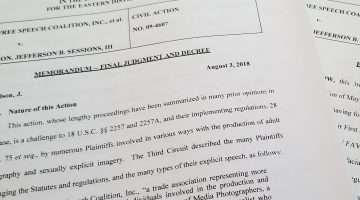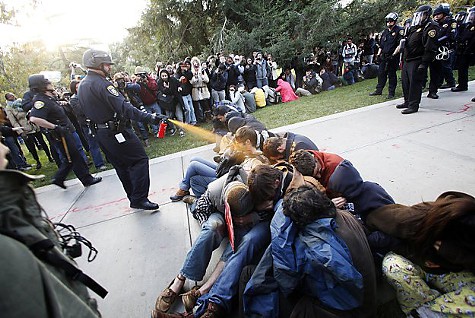 WASHINGTON, DC – The U.S. Supreme Court, in a 5-4 decision, has overturned an appeals court ruling that sided with Fox News Television in its challenge to a policy by the Federal Communcations Commission (FCC) that threatened broadcasters with fines if they allowed the use of even one curse word on air, the so-called “fleeting expletive” regulation.
WASHINGTON, DC – The U.S. Supreme Court, in a 5-4 decision, has overturned an appeals court ruling that sided with Fox News Television in its challenge to a policy by the Federal Communcations Commission (FCC) that threatened broadcasters with fines if they allowed the use of even one curse word on air, the so-called “fleeting expletive” regulation.
In 2004 the FCC expanded its policy against the use of expletives to include one time occurances, after several highly publicized incidents during which curse words – specifically, shit and fuck – were uttered on television shows that children could reasonably have been expected to be watching.
Under the new FCC rule, words such as those mentioned above are deemed so offensive that they always evoke sexual or excretory images,
even though they had not been treated as indecent before the rule change. In its last major broadcast indecency case 31 years ago, the court ruled that the FCC could keep curse words off the airwaves between 6 a.m. and 10 p.m. Back then, however, traditional television was the only medium that broadcast images to the pubic.
Today’s decision was mostly procedural and declined to address the underlying First Amendment issues inherent in the case, but instead remanded the case, FCC v. Fox Television Stations, back to the 2nd U.S. Circuit Court of Appeals in New York to decide whether the policy violates constitutional guarantees of free speech.
Justice Antonin Scalia wrote the majority opinion. Justice Thomas filed a concurring opinion and Justice Kennedy filed an opinion concurring in part and in the judgment–Justice Kennedy does not join the opinion in Part III-E. Justice Stevens filed a dissenting opinion, Justice Ginsburg filed a dissenting opinion, and Justice Breyer filed a dissenting opinion joined by Justices Stevens, Souter, and Ginsburg.
“[The] FCC’s new policy and its order finding the broadcasts at issue actionably indecent were neither arbitrary nor capricious,”Scalia wrote. “First, the FCC forthrightly acknowledged that its recent actions have broken new ground, taking account of incon-sistent prior FCC and staff actions, and explicitly disavowing them asno longer good law. The agency’s reasons for expanding its enforce-ment activity, moreover, were entirely rational. Even when used as an expletive, the F-Word’s power to insult and offend derives from itssexual meaning.
“And the decision to look at the patent offensiveness of even isolated uses of sexual and excretory words fits with Pacifica’s context-based approach. Because the FCC’s prior safe-harbor-for-single-words approach would likely lead to more widespread use, andin light of technological advances reducing the costs of bleeping of-fending words, it was rational for the agency to step away from its oldregime. The FCC’s decision not to impose sanctions precludes anyargument that it is arbitrarily punishing parties without notice of their actions’ potential consequences.”
Adam Thierer, a senior fellow with the Progree and Freedom Foundation, had submitted an amicus brief in the case along with scholars at the Center for Democracy & Technology in support of Fox News, and issued a quick response to the Court’s ruling.
“While the Court decided this case on purely procedural grounds, its failure to address the constitutional issues at stake will leave the First Amendment freedoms of both media creators and consumers in this country uncertain until another case winds its way up to the court, which could take years,” he wrote. “Until the Court clearly addresses the First Amendment protection of broadcasting in light of the Digital Revolution, we’ll just have to speculate as to how to reconcile the broadcast law of bygone era with the Court’s recent Internet jurisprudence—which has strongly supported the First Amendment.”











No Comment